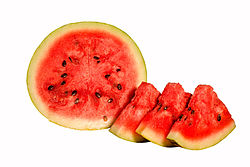- savoury (British; usually only for etymology 1)
Etymology 1
From the Middle English savory, savourie, from Old French savouré, from Old French savourer, from Late Latin sapōrāre, from Latin sapor (“taste, flavour”), from sapiō, sapere (“taste of, have a flavour of”).
Adjective
savory (comparative savorier, superlative savoriest) (American spelling)
- Tasty, attractive to the palate.
The fine restaurant presented an array of savory dishes; each was delicious.
- Salty and/or spicy, but not sweet.
The mushrooms, meat, bread, rice, peanuts and potatoes were all good savory foods.
- umami, modern (clarification of this definition is needed)
The savory rabbit soup contrasted well with the sweet cucumber sandwiches with jam.
- (figuratively) Morally or ethically acceptable.
Readers are to be warned that quotations in this chapter contain some not so savory language.
Translations
tasty, attractive to the palate
- Albanian: ngjelmë
- Arabic: شَهِيّ (šahiyy), مَرِيء (marīʔ)
- Armenian: համեղ (hy) (hameġ)
- Bulgarian: вкусен (bg) (vkusen)
- Chinese:
- Mandarin: 香 (zh) (xiāng), 好吃 (zh) (hǎochī), 鮮美 / 鲜美 (zh) (xiānměi)
- Dutch: smakelijk (nl)
- Esperanto: bongusta (eo)
- Estonian: maitsev (et)
- Finnish: maukas (fi), ruokahalua herättävä
- French: savoureux (fr), délicieux (fr)
- Friulian: gustôs
- Galician: saboroso (gl)
- German: schmackhaft (de), köstlich (de), lecker (de)
- Greek: νόστιμος (el) (nóstimos)
- Hebrew: ערב (he) (arév)
- Hungarian: ízes (hu)
- Indonesian: sedap (id)
- Italian: saporito (it), gustoso (it)
- Japanese: 香ばしい (ja) (こうばしい, kōbashii), 美味しい (ja) (おいしい, oishii)
- Latin: sapidus
- Mansi:
- Northern Mansi: атыӈ (atyň)
- Manx: blasstal
- Maori: mākarakara, mōkarakara
- Polish: smaczny (pl), smakowity (pl)
- Portuguese: saboroso (pt), apetitoso (pt), gostoso (pt)
- Romanian: savuros (ro)
- Russian: аппети́тный (ru) (appetítnyj), вку́сный (ru) (vkúsnyj), пика́нтный (ru) (pikántnyj) (piquant), о́стрый (ru) (óstryj) (spicy), пря́ный (ru) (prjányj) (spicy, heady)
- Serbo-Croatian: slasno (sh)
- Slovak: chutný, výrazne ochutený
- Slovene: okusen
- Spanish: sabroso (es), apetitoso (es)
- Swedish: välsmakande (sv)
- Thai: รสอูมามิ, อูมามิ (uu-maa-mí)
- Turkish: lezzetli (tr)
- Welsh: sawrus (cy)
|
salty or non-sweet
- Arabic: مالح
- Armenian: բարկահամ (hy) (barkaham), կծու (hy) (kcu), աղի (hy) (aġi)
- Chinese:
- Cantonese: 鹹 / 咸 (haam4)
- Hokkien: 鹹 / 咸 (zh-min-nan) (kiâm)
- Mandarin: 鹹 / 咸 (zh) (xián)
- Dutch: hartig (nl)
- Esperanto: salgusta
- Estonian: please add this translation if you can
- Finnish: suolainen (fi)
- French: salé (fr)
- Galician: salgado (gl)
- Georgian: please add this translation if you can
- German: herzhaft (de), pikant (de)
- Greek: αλμυρός (el) (almyrós)
- Hebrew: מלוח (he) (malúakh)
- Hindi: please add this translation if you can
- Hungarian: pikáns (hu)
- Indonesian: gurih (id)
- Italian: salato (it)
- Japanese: 旨味 (ja) (うまみ, umami), 塩辛い (ja) (しおからい, shiokarai)
- Latvian: please add this translation if you can
- Lithuanian: please add this translation if you can
- Malay: please add this translation if you can
- Mansi:
- Northern Mansi: солвалыӈ (solvalyň)
- Polish: niesłodki, pikantny (pl), wytrawny (pl)
- Portuguese: salgado (pt), de sal
- Romanian: sărat (ro)
- Russian: солёный (ru) (soljónyj), пикантный (ru) (pikantnyj)
- Serbo-Croatian: slano
- Slovak: slaný (sk)
- Spanish: salado (es), de sal
- Swedish: salt (sv)
- Tamil: please add this translation if you can
- Thai: รสอูมามิ, อูมามิ (uu-maa-mí)
- Turkish: tuzlu (tr)
- Vietnamese: ngọt thịt
- Welsh: safri
|
See also
More information Basic tastes in English (layout · text) ...
Close
Noun
savory (plural savories)
- (American spelling) A savory snack.
2007 April 18, Florence Fabricant, “Off the Menu”, in New York Times:On Friday the pastry chef Pichet Ong will open his own cafe, with sweets and savories served at tables and a counter.
Etymology 2
Wikispecies
From Middle English saverey, possibly from Old English sæþerie, from Latin satureia, influenced by or via Old French savereie.
Noun
savory (countable and uncountable, plural savories)
- Any of several Mediterranean herbs, of the genus Satureja, grown as culinary flavourings.
- The leaves of these plants used as a flavouring.
Translations
herb of genus Satureja
- Albanian: shtërmen (sq) m, thrumbishtë (sq) f
- Arabic: نَدْغ m (nadḡ)
- Armenian: կորթին (hy) (kortʻin), ծոթրին (hy) (cotʻrin), կորդյուն (hy) (kordyun), ծիթրոն (hy) (citʻron), մարզա (hy) (marza)
- Bulgarian: чу́брица (bg) f (čúbrica)
- Czech: saturejka (cs) f
- Danish: sar (da) c
- Dutch: bonenkruid (nl) n
- Finnish: kynteli (fi)
- French: sarriette (fr) f
- Galician: segorella f
- Georgian: ქონდარი (kondari)
- German: Bohnenkraut (de) n
- Greek: θρούμπι (el) n (throúmpi), θρούμπη (el) f (throúmpi)
- Ancient: θύμβρα f (thúmbra)
- Hungarian: csombord (hu), borsikafű (hu)
- Icelandic: please add this translation if you can
- Italian: santoreggia (it) f
- Japanese: キダチハッカ (kidachihakka), セイボリー (seiborī)
- Latin: cunela f, satureia f
- Macedonian: чубрика f (čubrika)
- Persian: مرزه (fa) (marze)
- Polish: cząber (pl) m
- Portuguese: segurelha (pt) f
- Romanian: cimbru (ro) m
- Russian: сатуре́я (ru) f (saturéja), ча́бер (ru) m (čáber)
- Serbo-Croatian:
- Cyrillic: чу̏бар m, ври̑сак m
- Latin: čȕbar (sh) m, vrȋsak (sh) m
- Slovene: šetraj m, čober m
- Spanish: ajedrea (es) f
- Swedish: kyndel (sv) c
- Turkish: zahter (tr) – however, like zaatar, the name is also used for other similar herbs
- Ukrainian: чабе́р m (čabér)
- Welsh: sewyrllys m, safri f
|
References
- “savory”, in OneLook Dictionary Search.





